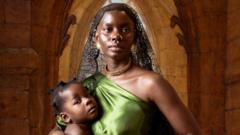Dola Posh embodies multiple identities: photographer, woman, Nigerian, mother, and Briton. However, after giving birth, she found herself entwined in confusion about her own identity. Just six days after welcoming her daughter amid the harsh realities of a COVID-19 lockdown, Dola lay in an English hospital bed, contemplating the drastic changes in her life and her passion for photography.
In her isolation, calls from relatives, eager to check on her and the baby, only heightened her anxiety. Thousands of miles away, her mother in Lagos represented a world Dola had left behind two years earlier, deepening her feelings of pressure and loss. “I thought: ‘I’m me; the baby’s out, I’m still me.’ But no, I wasn’t me any more,” she reflects, revealing the profound sense of identity loss that is often a precursor to postnatal depression, impacting black women disproportionately.
Once home, Dola faced an overwhelming barrage of unsolicited parenting advice, creating an atmosphere that stifled her emergence into motherhood. “There was too much talk, too much control around how I should raise the child. It made me feel like I didn’t know what I was doing,” she explains. The feelings of inadequacy and shame built up within her, as she struggled to find her footing in this new reality.
Amid sleepless nights and feelings of being a “zombie,” she confronted a dark moment when a voice urged her to take her own life. However, a tiny window of hope emerged when she reached out to her health visitor, who provided support. “I buried my head in shame, I just felt so much shame because I’m not even a good mother,” she recalls, illustrating the depth of her despair.
Encouraged to see a therapist, Dola embraced her camera as a means to confront her feelings and began to create self-portraits. The art of photography, intertwined with her cultural roots, became a therapeutic outlet. Drawing inspiration from her upbringing in a Nigerian church, the imagery of Madonna and child emerged in her work, a connection she hadn't initially recognized.
Dola’s portraits reflect not only her journey but also serve as a celebration of motherhood. “When I put on the veil, it didn’t feel like that empty person anymore. It felt more me,” she said, connecting with her heritage and its essence. As she explored her emotions through photography, Dola began to shift her narrative, sharing her truths about the struggles of motherhood and postnatal depression.
Dola's journey has led to empowerment, not just for herself but for others. With the recent award from Leica to further continue her project, she aims to foster conversations around mental health within the black community. “I want a world where black mothers don’t have to carry so much burden and feel like they have to go through that journey alone,” she asserts.
In the UK, the disproportionate effects of postnatal depression on black women highlight the critical need for open dialogue. Dola’s candidness about her battle serves as a beacon of hope, urging many to break the silence and embrace their narratives. “I almost ended my life, I’m not ashamed of it – I am still an artist, I am still a woman, and I have something to say,” she concludes, inspiring others to share their experiences and foster change.





















